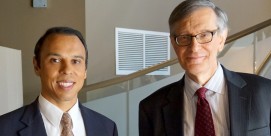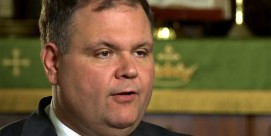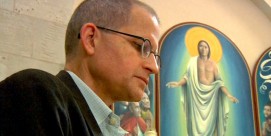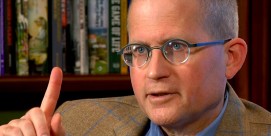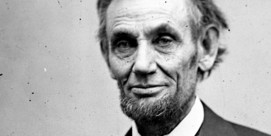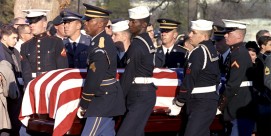Ronald C. White Jr: Get Right with Religion
A half century ago, Senator Everett Dirksen of Illinois said “the first task of every politician is to get right with Lincoln.” If he were speaking today, he might say the first task of every politician is to get right with religion.
Governor Mitt Romney of Massachusetts understood that he had a special burden to get right with religion today (December 6). Many commentators have likened Romney’s challenge to the address by candidate John F. Kennedy 47 years ago to the Greater Houston Ministerial Association, but the challenge was quite different. Despite the presence of an anti-Catholic spirit coming forward from the 1950s, Kennedy was a member of an ancient, large church whose membership comprised 33 percent of the population, whereas Romney is a member of a newer religious tradition whose membership comprises 3 percent of the American population.
The way each candidate framed his speech is revealing. Kennedy, a master speaker, built his tightly focused, briefer speech around a steady litany of “I believe in an America where…,” with few specifics about the American religious landscape. He even said at the outset, “we have far more critical issues to face in the 1960 election,” a comment that reflected accurately the very different America to which he spoke. Romney, by contrast, acknowledged that religion was a critical issue, and the architecture of his address contained far more building blocks, because his burden was both to reach out to an American public expecting to hear candidates speak their faith, but at the same time not turn away other Americans concerned that there is a recent conspiracy to construct a certain kind of religion in American society.
Romney chose not to place the focus on his personal faith but to make a plea for the role of faith in the public square. For me, his thesis sentence was: “It is important to recognize that while differences in theology exist between the churches in America, we share a common creed of moral convictions.” He illustrated this conviction by listing as examples “abolition, or civil rights, or the right to life itself,” thereby including causes from the 19th, 20th, and 21st centuries embraced by religious people from left to right on the religious spectrum. Romney was making a plea for a common ethic or morality as the ultimate basis for the role of religion in America.
This was a speech in which Governor Romney sought to earn the right to be heard. He did so by affirming his faith in Jesus Christ as the Son of God, but admitting that others may have differing beliefs about Christ. He affirmed the separation of church and state, but stated that the intention of the founders was not the elimination of religion from the public square. He recalled that the first Americans came to find religious liberty, but acknowledged that once here ended up denying religious liberty to those with whom they disagreed, citing Anne Hutchinson, Roger Williams, and Brigham Young as examples. Romney celebrated the religious vitality in America by contrasting it with the empty cathedrals of a Europe “too ‘enlightened’ to venture inside and kneel in prayer.” A strength of Romney’s speech, and a contrast with Kennedy’s speech, were his affirmations of the specific beliefs, ceremonies, prayers, and traditions of Catholics, Evangelicals, Pentecostals, Lutherans, and Jews.
Romney’s speech also contained a warning about “the creed of conversion by conquest.” Although Romney mentioned the murder of Christians, Jews, and Muslims, his focus was on the danger of “theocratic tyranny” by “radical Islamists.”
In the end, Romney offered an assurance that sounded very much like Kennedy in 1960: “Let me assure you that no authorities of my church, or of any other church, for that matter, will ever exert influence on presidential decisions.”
Did Romney get right with religion in 2007/8? He is in a box, and he knows it. On the one hand, he will never be able to get right with the religion of those who will never vote for a Mormon. On the other hand, in a brief address, Romney made a thoughtful argument for the role of religion in the public square that he hopes can reach across denominational divisions.
The question Governor Romney did not address was what was the content of that religion? He had to say, even as Kennedy had to say, that he would not be influenced by his church in forming the moral guidelines for his political leadership. But why not? What are the foundations of morality? In a religiously diverse society some have argued that we can simply separate ethics from theology. George Washington declared long ago that morality severed from religion will not long remain moral. Abraham Lincoln, in his Second Inaugural Address, combined an indicative, what God has done — “The Almighty has his own purposes” — with an imperative, what we are to do — “With malice toward none; with charity for all.” Governor Romney affirmed today that religion needs to be part of the public square. He, and other candidates, have yet to tell us in any specificity what the indicatives are that will allow us to act on what imperatives to make this a more loving and just society.
Ronald C. White, Jr. is the author of LINCOLN’S GREATEST SPEECH: THE SECOND INAUGURAL and THE ELOQUENT PRESIDENT: A PORTRAIT OF LINCOLN THROUGH HIS WORDS. He is writing a biography of Lincoln that will be published by Random House in January 2009.

